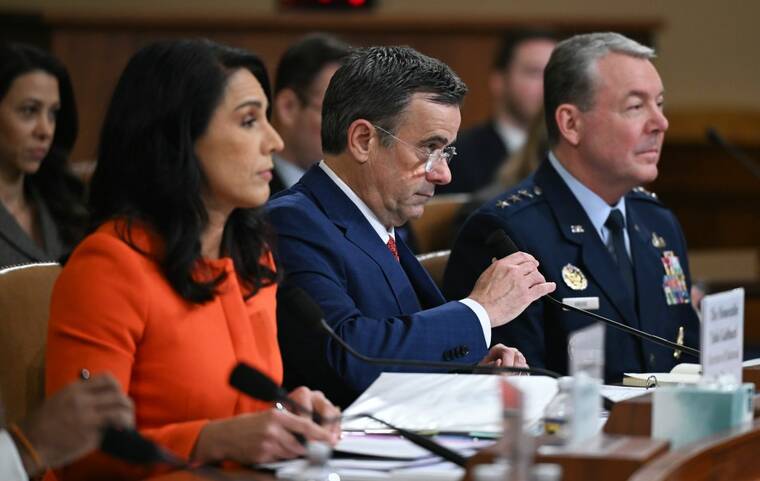Trump calls Signal leak episode a ‘witch hunt’

KENNY HOLSTON/THE NEW YORK TIMES
From right: Director of the Defense Intelligence Agency Lt. Gen. Jeffrey Kruse, CIA Director John Ratcliffe and Director of National Intelligence Tulsi Gabbard, testify during a hearing on global threats before the House Intelligence Committee in Washington, on Wednesday. President Donald Trump decried concerns over the transmission of military plans on the messaging app Signal as a “witch hunt,” borrowing the language of persecution that he has applied to the many investigations that have targeted him and his campaign over the years as he sought to deny the seriousness of the leak.
President Donald Trump decried concerns over the transmission of military plans on the messaging app Signal as a “witch hunt,” borrowing the language of persecution that he has applied to the many investigations that have targeted him and his campaign over the years as he sought to deny the seriousness of the leak.
The president addressed reporters from the Oval Office on the same day top members of his intelligence team faced sharp questioning from House Democrats over their use of the consumer messaging app to discuss planned U.S. military airstrikes in Yemen. And messages with details of the precise time of the strikes were published on Wednesday by The Atlantic, whose editor-in-chief had been inadvertently added to the group.
Days after the leak went public, Trump and his aides were still trying to downplay it and have yet to establish a coherent narrative.
Last night, Michael Waltz, the national security adviser, said in an appearance on Fox News that he had created the group and would take full responsibility for the leak.
But Trump and Waltz have also suggested that Jeffrey Goldberg, the journalist inadvertently added to the group chat, may have entered the conversation through some sort of security vulnerability.
“I think Signal could be defective, to be honest with you,” Trump said at the White House on Wednesday. Hours earlier, Karoline Leavitt, the White House press secretary, said Signal was an “approved app” used by several national security agencies, “because it is the most secure and efficient way to communicate.”
Don't miss out on what's happening!
Stay in touch with breaking news, as it happens, conveniently in your email inbox. It's FREE!
Trump and administration officials had also insisted for days that the information leaked in the Signal chat was not classified. But the president appeared to backtrack on that claim in his Oval Office remarks after the full transcript was released.
Asked if he still believed nothing classified was shared, he responded: “That’s what I’ve heard. I don’t know. I’m not sure, you have to ask the various people involved.”
Still, Trump said that he was ultimately not concerned about the leak, proclaiming that “there was no harm done, because the attack was unbelievably successful.”
The new messages published by The Atlantic showed that Defense Secretary Pete Hegseth shared critical details of the upcoming operation: most crucially, the precise timing of the launches from aircraft carriers of the U.S. military jets that were to strike Houthi targets. Trump claimed Hegseth, whom Democrats have called on to resign, had no role in the text chain and was doing a “great job.”
Here’s what else to know:
— Hegseth speaks: Hegseth did not offer an apology in remarks to reporters in Hawaii, relying again on the semantic argument that his disclosures were not “war plans” but had been intended to “provide updates in real time.” He did not address how a disclosure that he released 30 minutes before flights took off and two hours before the fighter jets began their strikes was “real time.”
— Republican seeks investigation: Sen. Roger Wicker, R-Miss., the chair of the Senate panel that has oversight of the Pentagon, became the first member of his party to call for an independent review. Wicker, one of the toughest Republican critics of Hegseth, and Sen. Jack Reed of Rhode Island, the top Democrat on the committee, will request an expedited investigation by the Defense Department’s Office of Inspector General. But it is unclear who would oversee such an investigation: During the first week of his second term, Trump fired the inspector general at the Pentagon.
— Rubio acknowledges “mistake”: Secretary of State Marco Rubio confirmed during a visit to Jamaica that he was among the members of the chat group, and that “someone made a big mistake” in adding Goldberg. The official who added the journalist was Waltz, the national security adviser, who has said he takes “full responsibility.”
This article originally appeared in The New York Times.
© 2025 The New York Times Company



